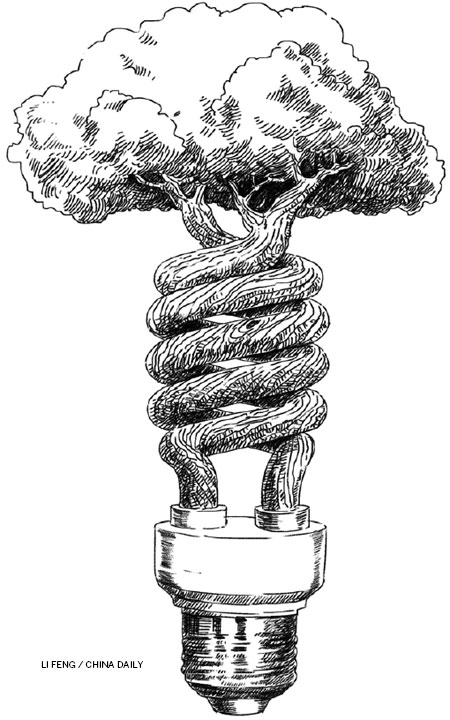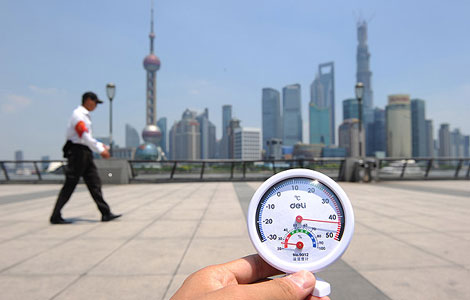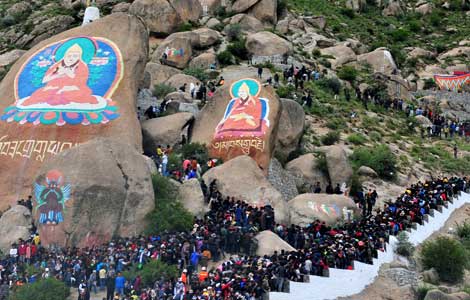Waste no time in stopping waste
Updated: 2013-08-07 07:26
By Li Lailai (China Daily)
|
||||||||

Being "thrifty" means spending one cent as if you have only half a cent. This is an old Chinese saying to warn people to handle affluence without forgetting about a potential crisis. Underlying this common sense is an ethic rooted in Chinese culture: wasting is bad.
President Xi Jinping has urged Chinese people to "build a thrifty society", because if we persist with our business-as-usual production and consumption pattern we would invite a resource and environmental crisis.
One "inconvenient truth" is that China uses about 20 percent of the total global energy to produce about 12 percent of the world GDP. The country's energy consumption per unit of GDP is 2.2 times that of the world average. A similar pattern is seen in the consumption of other resources such as steel, cement and other raw materials, as highlighted by State leaders and experts at the International Forum on Building Ecological Civilization hold in Guiyang, Guizhou province, last month. In doing so, the leaders indicated that huge amounts of energy could be saved in China by improving efficiency.
One consequence of high energy and/or resource consumption is environmental pollution. Five of the seven major river systems in China are polluted, and their water quality at 40-50 percent of the monitored points is below the level III national standards. Since early this year, people living in North China have experienced serious air pollution. And air pollution, according to a Chinese Academy of Social Sciences report, shaves off up to 9 percent of China's GDP.
Natural resources are limited, so is the capacity of the environment to cope with their loss and subsequent pollution. By continuing with unchecked growth, we will deplete the resources and over-saturate the environment with pollutants. Technology could be a solution, but the development of technology can never match the pace of the current production and consumption levels.
What then is the solution? The answer is "building a thrifty society".
In a thrifty society, wealth is created both by saving and production. If we save energy, we can make do by generating less energy. The difference is that (unlike a power plant), saving energy does not require resource conversion-coal/oil and water to electricity. The energy and environmental constrains China faces make it clear which solution is the right one.
It is encouraging to see some Chinese practice "thrift" in their own ways. For example, a company in Xiangyang, Hubei province, has set up a unit near the city's wastewater treatment plant. It recycles the sludge from the wastewater treatment plant in its bio-digesters to produce purified methane, which powers one-third of the city's taxis. Had it not done so, the methane - which is a 25 times more potent than carbon dioxide over a 100-year timeframe - from the wastewater treatment plant would have polluted the atmosphere.
The bio-digester system has also saved thousands of gallons of gasoline from being consumed by the city's cabs. Besides, the residue from the sludge treatment is a good organic compost, which nearby farms sell with seedlings. The compost helps trees and plants to grow up into forests, which are of an important element of the ecosystems performing its functions to serve the human wellbeing and purify the environment.
But such a "thrifty" production-consumption practice is still weak in China. Government support, along with good technology that could cost more than conventional production facilities, is needed to make this practice widespread. The resultant products require a supportive market and should enjoy the same benefits that goods produced by monopolies do.
A "thrifty society", however, cannot be built without individuals' involvement. To begin with, people should stop wasting food on the dinner table, especially because media reports say the amount of food wasted in China every year could feed 200 million people for a year.
A good example of conservation, for instance, was provided by a study my son and his high school friends carried out five years ago on the use of water in Beijing. All the members of the households they interviewed (60 in total) used the same bucket of water at least three times - to wash rice, wash vegetables and clean the floor. Perhaps they were conscious of the preciousness of water because of their income level, but the practice didn't affect their quality of life. The boys who carried out the study were so impressed by the households that they changed their own wasteful behavior.
Many similar practices can still be found in China and should be promoted vigorously to save precious resources and the environment, and help build a "thrifty" society.
Both at the individual and societal level, building a "thrifty society" is a matter of ethics. If we view society as a system, the result of the input-output loop is nothing but depletion of limited resources and damage to the environment, making life even more difficult for our future generations. And caring for future generations by leading a "thrifty" life is part of traditional Chinese culture, a culture that is rich in reason and values, and has no place for waste.
The author is country director of World Resources Institute in China.
(China Daily 08/07/2013 page9)
Most Viewed
Editor's Picks

|

|

|

|

|

|
Today's Top News
China vows to severely punish newborn traffickers
Sri Lanka suspends NZ milk powder imports
PV firms face risks despite EU deal
Small firms should also think global
China issues record fines to dairy firms
US, China trade deficit narrows
NBA courts Sina Corp
EC denies delay in telecoms probes
US Weekly

|

|













